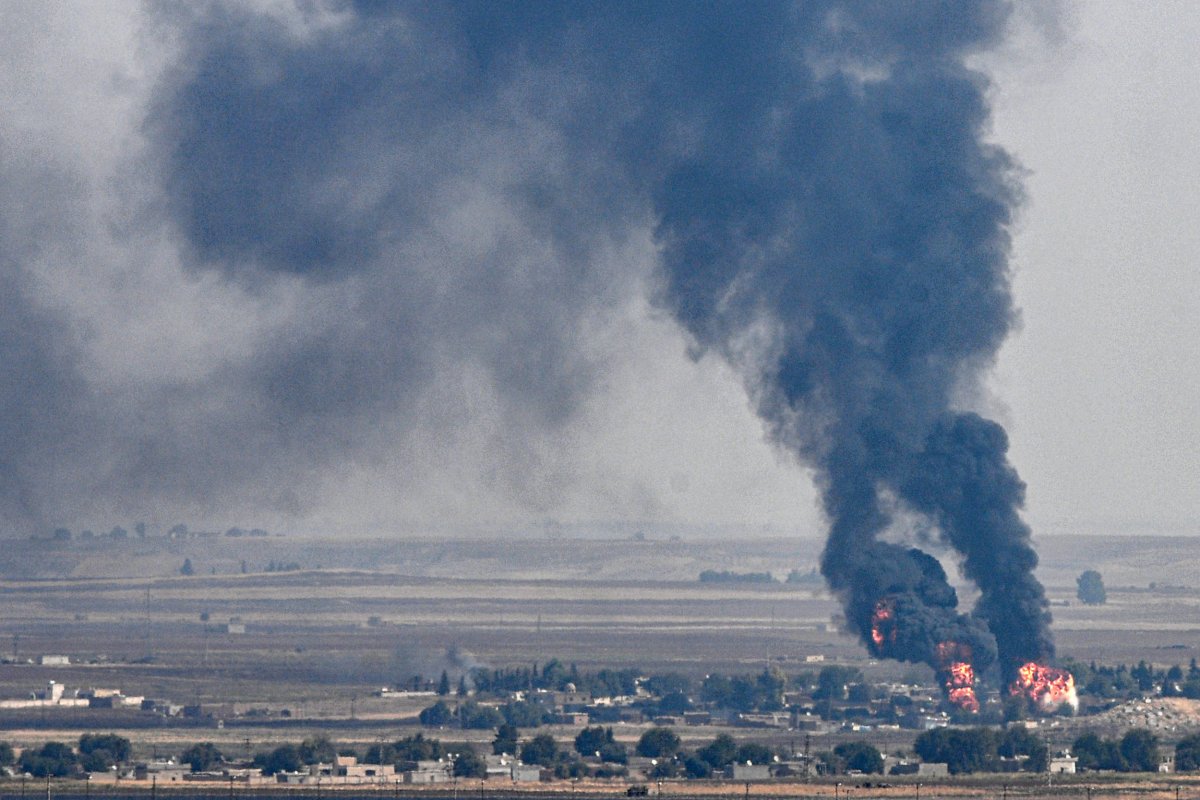Vice President Mike Pence has announced a "ceasefire" between Turkey and Kurdish-led forces in northern Syria following talks in Ankara, but both sides have already pushed back against the United States' remarks.
Leading a delegation to the Turkish capital, President Donald Trump's deputy told reporters Thursday "today, the United States and Turkey have agreed to a ceasefire in Syria." The deal entails a 120-hour, or five-day, cessation of hostilities on the part of Turkish forces and allied Syrian insurgents to allow the People's Protection Units (YPG), which helped a U.S.-led coalition defeat the Islamic State militant group (ISIS) yet was considered linked to the outlawed Kurdistan Workers' Party (PKK) by Turkey, to surrender heavy weapons and exit positions 20 miles from the border.
These remarks were disputed, however, by Turkish Foreign Minister Mevlut Cavusoglu, who told a press conference that "this is not a ceasefire." He added: "A ceasefire is held only between two legitimate parties and we're just taking a pause for the safe zone, which is the goal of the operation."
The Kurdish-led side also pushed back, with Syrian Democratic Council—the political wing of the Syrian Democratic Forces—member Sihonak Dibo tweeting: "The resistance of dignity bore its first fruits: No safe zone will happen in northern Syria under Turkish auspices." He added: "The Turkish occupation in northern Syria has failed."
Syrian Democratic Forces commander Mazloum Kobani later told Ronahi TV, an outlet affiliated with his group, that he "accepted the agreement, and we will do what is necessary to help it succeed," but indicated that it only applied to "the area from Sari Kani [known in Arabic as Ras al-Ayn] to Tel Abyad," a fraction of the span of the Turkey-claimed "safe zone," in comments translated by Kurdish outlet Rudaw. "The agreement doesn't cover the rest of the Northern Syria areas, and it will be discussed later," he added, rejecting "Turkish occupation."

Later on Wednesday, U.S. special representative for Syria James Jeffrey attempted to explain the mix-up in terminology with Ankara: "As you've seen in this 13-point document, we have a ceasefire. It is not called a ceasefire in the document."
"What the Turks say is that we'll pause Operation Peace Spring in order to allow the withdrawal of YPG from the safe zone within 120 hours. Operation Peace Spring will be halted upon completion of this withdrawal," he added. "We use the word ceasefire. The Turks do not because it's not in the agreement. But what we mean is—and we defined this very carefully—a ceasefire is no forward movement of troops on the ground and no military action other than self-defense."
He also said that "the Turks talk about an aspirational safe zone" extending "from the Euphrates to the Iraqi border," but added that "the central part of the northeast"—apparently referring to the regions from Ras al-Ayn to Tel Abyad—was "the focus of our attention now because that's the area that we define as the Turkish-controlled safe zone."
Otherwise, the terms of the deal appear to match up with the original goals of Turkey's so-called "Operation Peace Spring" that was launched last week as Trump announced his intention to pull troops embedded alongside the Syrian Democratic Forces in northern Syria. Trump initially signaled support for Turkey's military action, but later joined the Pentagon in condemning it and threatened Ankara with sanctions, tariffs and suspending trade deal talks.
These punitive measures would be lifted if the current agreement was implemented. Pence had said that the U.S. received assurances that the YPG agreed to leave the "safe zone" and had already begun pulling out, but the group has made no public statements.
In the wake of the U.S. departure, the Syrian Democratic Forces has struck a deal with the Syrian government, an ally of Russia and Iran. The U.S. had originally joined Turkey and other allies in backing the rebel and jihadis attempting to overthrow Syrian President Bashar al-Assad, but later shifted its support to the mostly Kurdish Syrian Democratic Forces as battling ISIS became a priority.
With the militants mostly defeated, Trump has repeatedly sought to pull U.S. troops out of northern Syria, where Russian and Syrian soldiers have since occupied a number of their posts. One of these bases, as Newsweek reported Monday, was in the strategically-located city of Manbij, which has changed hands several times throughout Syria's eight-year war and now lie on the front lines of the Turkey-backed Syrian insurgent campaign and a newly-formed Syrian-Kurdish-led alliance supported by Russia.
According to the U.S.-Turkey agreement 'which allegedly brings peace to the area,' Trump hands over northern Syria to Erdogan after he displaced 300 thousand civilians and killed and wounded hundreds of them over 8 days of the so-called Operation 'Peace Spring'," the Syrian Observatory for Human Rights, a U.K.-based monitor with ties to Syria's exiled opposition, said in a statement.
The activist group then reported "violent clashes" between the Turkey-backed Syrian rebels and Kurdish forces near Hezwan, west of the city of Al-Bab, another frontier between the opposing forces in northern Aleppo. This followed battles elsewhere in the area between the two factions.
This article has been updated to include a statement from the Syrian Observatory for Human Rights, comments from Syrian Democratic Forces commander Mazloum Kobani and remarks from U.S. special representative for Syria James Jeffrey.
Uncommon Knowledge
Newsweek is committed to challenging conventional wisdom and finding connections in the search for common ground.
Newsweek is committed to challenging conventional wisdom and finding connections in the search for common ground.
About the writer
Based in his hometown of Staten Island, New York City, Tom O'Connor is an award-winning Senior Writer of Foreign Policy ... Read more
To read how Newsweek uses AI as a newsroom tool, Click here.








